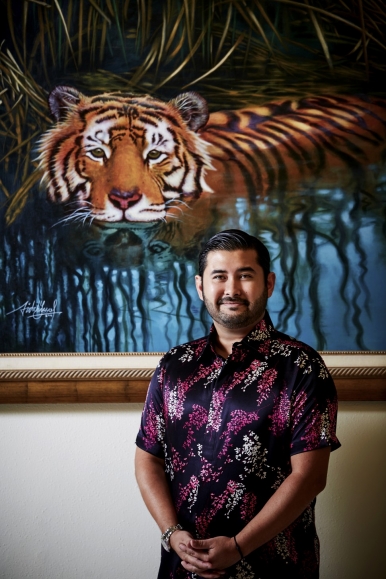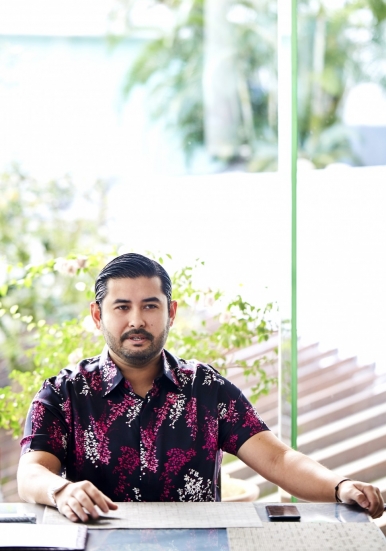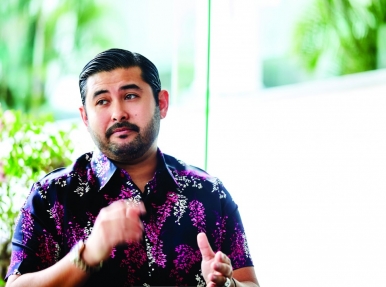Putting Malaysian football back on track the right royal way

The Crown Prince of the Malaysian state of Johor, His Royal Highness Major General Tunku Ismail ibni Sultan Ibrahim, won the presidency of the Football Association of Malaysia (FAM) uncontested in March this year. Since then, Tunku Ismail, or more fondly known by the acronym of TMJ for Tunku Mahkota Johor, has kicked off the biggest shake-up to the governing body and the structure of local football in three decades.
On completing his 100 days in office, he shares with Going Places his frustrations, his hopes and his aspirations to see Malaysian football emerge from what he terms as a 30-year slump. TMJ is also the owner of Johor Darul Ta’zim or JDT. The football club of the southern Malaysian state is also the most successful in the country.

You’re obviously very passionate about football. First, with the rebranding of JDT and now, taking on the mammoth task of turning around the Malaysian football team. Have you always been interested in the game or are you the sort that simply cannot resist a challenge?
I am a person who likes new challenges. I guess that’s how I was raised since my military training days. I don’t like to feel comfortable. I’m always looking for new things. Football is something that I have been very passionate about since I was very, very young. I grew up playing with friends. Now, I have this new passion – to manage a football team, and that means to implement professionalism and innovation in whatever way I can to improve the team. That’s my passion now. I hope the fire will continue to burn for a long time because I am always very eager to look for new challenges.
There is tremendous pressure to turn around the national team. Do you think expectations have been set too high, and are they fair?
There are three types of expectations. One is realistic. Second, the eagerness and anticipation to see improvements and third, unreasonable expectations. Some want to see us achieving success but there are also those who would like to see us fail and I’m being very honest. We live in a country where the majority of the people in the districts are still uneducated. For this country to move forward, the first thing we have to solve is education. I feel that with education, we can solve a lot of problems in this country, not just in sports but in every single aspect of our lives. I believe we are capable and have the potential to be a great nation.
You have obviously gone back to the drawing board to get the right system in place. You have appointed a new head coach, Nelo Vingada, and you have fired staff at FAM. What’s next on your to-do list?
In the last few months, I have changed more than what people who have been there for the last 30 years have done. I have urged the Football Association of Malaysia to be more engaging in tackling problems, to work faster and at the same time, to be very engaging with the fans and not keep them in the dark. We have become very transparent so our fans know what our goals are and understand what our targets are. That is very important. After that, we need to get the very best people in football, people who are passionate and know about football to join us, for example, we are searching for a new sporting director. We are looking at every single area where there are weaknesses, and trying to fix them.

What are some of these areas of weakness?
We are putting a lot of energy and time now looking into the standard of refereeing in the country. There have been complaints about the poor performance of referees. In order to improve the standard of our football, the different areas – management, team and refereeing – they all need to move forward together.
You turned around JDT. That was very successful. Are you going to employ the same strategy at FAM?
It’s going to be a bit different with FAM. In FAM, there are people who are willing to improve but there are also people who are in denial. In JDT, I control everything, so it’s easier for me to work with the team that I have. I don’t think the success of JDT can be replicated in FAM because it’s a completely different structure. At the end of the day, we are trying our best to inject more professionalism into our sport by assisting and educating all the participating teams. For example, when it comes to financial management, we are trying to ensure that the teams spend within their means. They should not be asking (state) governments for money if they go overboard because that’s money for the people. It’s wrong. Some are willing to change, some are more reluctant, therefore, it is a challenge in FAM.
When you took over in March, you said that FAM was RM40 million (USD9.3 million) in debt. How are you going to turn this around and where are you going to find the financial resources to do what you plan to do for the team?
We have approached a few companies that are willing to be the sponsor for our domestic competition (Malaysia Cup). We are also trying to see all the big companies and businessmen in Malaysia who have made a lot of money in this country to at least contribute something to the football association because at the end of the day, this belongs to the people. It doesn’t belong to any individual. But it’s tough. It’s not going to be easy, but it’s something that we have to do. We’re trying to get the best possible outcome because right now, Indonesia is moving in another direction, Thailand is also moving a big step forward. They have big budgets from broadcasting rights. We are trying to get the same thing here, to get a big budget that at the end of the day, all participating (state) teams will gain from it. This will enhance the value of our domestic competition and indirectly improve our national team as well.
Do you stay up thinking about these problems?
No. I sleep fantastic. When I was younger, yes, I do think about what other people have to say or what people expect of me but since the birth of my daughter last year, I couldn’t care less. I just want to take care of my family. Obviously, my state duties come first. That’s my responsibility. As long as my fellow Johoreans and Johor are doing OK, FAM is just a – some people are not happy when I say this but it’s the truth and I like to be open – FAM is my part-time job. To me, even if I put in 50 percent but we see positive changes and good results, that means I have done my job.
When you took over the presidency in March, you set a goal to turn around the team in one term (four years). Are you still keeping to that goal?
This is going to be the longest one term of my life! But seriously, if you look at us today, we have a foreign coach, which we have all been wanting because we need that foreign expertise. The team is training in the best facilities and playing in the best stadium in the country (in Johor Bahru), and obviously, we’re trying to get the team more exposure. FAM is also more transparent nowadays in terms of engaging with the fans. Lately, we have seen the teams playing in the domestic competition becoming very competitive and that’s a very good sign. So there are a lot of positive changes taking places.
What about our women’s national team, which has been languishing for far longer than our men’s team, are you looking into this as well?
Not much effort has been put into our women’s team because it’s not a popular sport, especially with the perception of women in sports in this country. But with our new organisation now, we will be putting more focus into the structure of women’s football, and we will try to get a bigger budget so that we can improve upon what they have done previously.

What is your vision for Malaysian football? Will we return to our glory days of the 1970s and 1980s?
I think that’s secondary because our neighbouring countries have moved so far forward while we slept for 30 years, that it’s not going to be easy to catch up. I’m being very realistic. I believe we can improve but everyone in FAM, including all the affiliates, must have the same goals and targets and we must work hand-in-hand. I believe we will see results from the changes we are making. What I am more concerned about is education. It’s very hard to move forward if fans, and even some individuals in FAM, continue to judge us using emotions rather than brains. This attitude is harder to change because you can do a hundred positive things but you’re judged based on one slip-up. When I was young, I always blamed the poor state of our football on FAM but now that I am inside FAM, I realise it’s not just FAM but the local football fans as well. For example, in Thailand, the fans there are very supportive of the national team. They spend on team merchandise because they want to be part of the team. That is something we do not see here. Here, fans still see the domestic Malaysia Cup as the biggest thing in the world. If we still have that mentality, then you can forget about changing.





